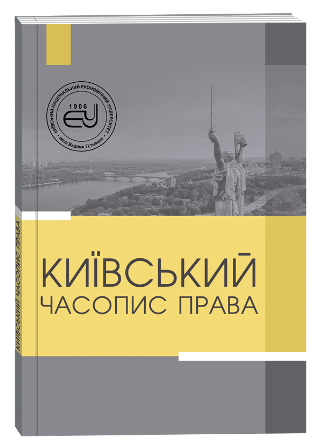GROUNDS OF INVALIDITY OF MARRIAGE IN THE MATRIMONIAL LAW OF THE HABSBURG MONARCHY AT THE END OF THE 18TH – AT THE BEGINNING OF THE 19TH CENTURY
DOI:
https://doi.org/10.32782/klj/2025.1.1Keywords:
grounds of invalidity of marriage, Josephine Code of 1787, Civil Code for Galicia of 1797, General Civil Code of the Austrian Empire of 1811, matrimonial law, Habsburg monarchyAbstract
The article is devoted to highlighting the grounds for invalidity of marriage enshrined in three civil codes of the Habsburg Monarchy: the Josephine Code of 1787, the Civil Code for Galicia of 1797 and the General Civil Code of the Austrian Empire of 1811. The author elaborated primary sources, including h the German-language text of the Josephine Code. Therefore, a comparative analysis of the relevant norms of the mentioned codes was carried out.The article describes in detail the grounds for invalidating a marriage, such as: 1) lack of consent due to the inability to express it (therefore, it was established that marriages of insane and demention people, minors, as well as minors and adults with limited legal capacity without the consent of their legal representative were invalid); 2) lack of consent due to insufficient valid consent (that is, illegal methods of obtaining consent to enter into marriage, namely by intimidation, kidnapping, delusion about the identity of the future spouse);3) lack of physical capacity for marital cohabitation; 4) imprisonment for a serious crime; 5) staying in another valid marriage; 6) the presence of a spiritual rank or monastic vow; 7) difference in faith (namely, marriage between Christians and persons of non-Christian faith was invalid); 8) blood relationship (in the ascending and descending lines, as well as in the lateral line up to the second degree); 9) consanguinity by law (with relatives of the former spouse on the ascending and descending lines, as well as on the side line up to the second degree); 10) adultery committed by the parties between themselves while they (both or one of them) were in a previous marriage; 11) murder (or attempted murder) of a previous spouse.The author stated that Josephine and Galician codes provided for a similar list of grounds for invalidity of marriage, as in the Code, with the exception of a conviction for a severe criminal penalty.
References
Josephinisches Gesetzbuch (1787). URL: http://www.koeblergerhard.de/Fontes/JGB20070429-rund18800woerter.htm.
Josephinisches Gesetzbuch (JGS 591). Faksimile des. Joseph des Zweyten, Römischen Kaisers, Gesetze und Verfassungen im Justitz-Fache. Jahrgang von 1785 bis 1786. Zweyte Fortsetzung (1786). Justizgesetzsammlung. ALEX – Historische Rechts- und Gesetzestexte Online. Wien: Kaiserlich-königliche Hof-und Staats-Serarial-Druckerei, 1817. S. 71-130. URL: https://alex.onb.ac.at/cgi-content/alex?apm=0&aid =jgs&datum=10030003&zoom=2&seite=00000071&ues=on&x=16&y=9.
Цивільний кодекс Галичини, 1797: [проект Карла-Антона Мартіні / передм. К. Нешвара; вступ В. А. Васильєва; пер. з нім.: М. Мартинюк, О. Павлишинець]. Івано-Франківськ: Вавилонська бібліотека; Юрид. компанія «Моріс Ґруп», 2017. 271 с.
Загальне цивільне уложення Австрійської імперії 1811 року. Кодифікація цивільного законодавства на українських землях: Т. 1 / уклад. Ю. В. Білоусов, І. Р. Калаур, С. Д. Гринько та ін.; за ред. Р. О. Стефанчука та М. О. Стефанчука. Київ: Правова єдність, 2009. 1168 с. С. 1025-1149.
Savuliak Roman. Marriage law according to the Josephine code of 1787 and the reception of Roman law in its provisions. Journal on European History of Law. 2024. Volume 15, Іssue 2. Р. 175-187. URL: http://www. historyoflaw.eu/czech/JHL_02_2024.pdf.







